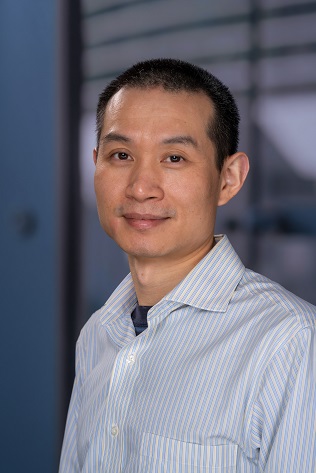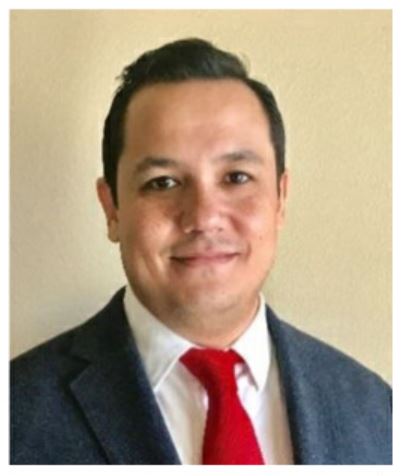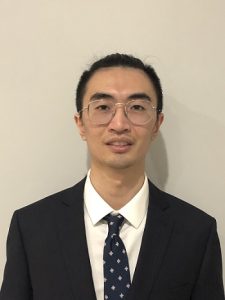
John Cooke, MD, PhD
Dr. Cooke’s research focuses on restoration or stimulation of endothelial functions such as vasodilation and angiogenesis, using small molecules or stem cell therapies. Recent insights from the laboratory have clarified the role of innate immune signaling in nuclear reprogramming to pluripotency and therapeutic transdifferentiation for vascular disease.

Longhou Fang, PhD
Dr. Fang’s laboratory focuses on the role of apoA-I binding protein (AIBP) in lipid metabolism, angiogenesis and lymphangiogenesis under pathophysiological conditions. This includes identifying its molecular mechanism and unravelling the roles of AIBP in heart hypertrophy, heart ischemia and reperfusion, peripheral artery ischemia and reperfusion, corneal angiogenesis, wound healing, tumorigenesis as well as heart regeneration in preclinical models.
View Dr. Fang’s seminar to learn more about his research.

Nhat Tu Le, PhD
The Le’s research group is interested in molecular mechanisms by which disturbed blood flow causes endothelial cell inflammation, dysfunction, apoptosis, and atherosclerotic plaque formation. Dr. Le and colleagues have developed both in vitro and in vivo systems to address this topic, and has identified a crucial role for the p90RSK-ERK5 kinase complex in this process. Dr. Le and colleagues have also discovered the formation of a pro-inflammatory and pro-senescence complex comprising p90RSK, a member of the shelterin complex, and p65. In addition, the role of endothelial ERK5 kinase in the regulation of statin-induced anti-inflammatory effect was also demonstrated using murine heart transplantation model. Recently, Dr. Le and colleagues have identified that a membrane-associated guanylate kinase-1 (MAGI1) is an unexplored molecule that regulates both endothelial inflammation and anti-viral response.
Besides the significant improvement in patient survival rate, modern cancer therapies including chemotherapy, immunotherapy, radiotherapy, targeted therapy, and surgery cause not only cardio-toxicity but also vascular complications such as angina (spasm), myocardial infarction, venous or arterial thrombosis, and newly developed or worsened hypertension. The Le’s research group is also interested in understand how cancer therapies mediates vascular complications.

Daniel Kiss, PhD
Dr. Daniel L. Kiss is an Assistant Professor in the Department of Cardiovascular Sciences and a member of the RNA Therapeutics Program at the Houston Methodist Research Institute (HMRI) in Houston, Texas. Dr. Kiss is also an Associate Research Member of the Houston Methodist Cancer Center and holds an appointment as an Assistant Professor of Molecular Biology in Medicine at Weill Cornell Medical College.
Dr. Kiss completed his doctoral and postdoctoral training at institutions with strong RNA biology programs. He earned his Ph.D. in Molecular Biology and Microbiology from Case Western Reserve University in 2010, where he was part of the Center for RNA molecular Biology (now The Center for RNA Science and Therapeutics). His doctoral work focused on how the RNA exosome, which is the predominant RNA degradation machine for mammalian cells, was regulated and functioned in RNA processing and turnover. He then moved to The Ohio State University for his postdoctoral research where he was part of The Center for RNA Biology. Under the supervision of Dr. Daniel Schoenberg, he earned two separate postdoctoral fellowships focusing on his cytoplasmic capping research. He continues his focus on cytoplasmic capping of RNAs at the HMRI.
As an independent principal investigator, Dr. Kiss contributes to the broader scientific community. He’s served as a peer reviewer for multiple journals, participates in an NIH study Section, is an active member of multiple scientific societies related to his research, and is committed to outreach efforts to raise awareness and interest in biomedical research.

Francisco Altamirano, PhD
Francisco Altamirano Ph.D. is an Assistant Professor at Houston Methodist Research Institute and the Weill Cornell Medical College.
Dr. Altamirano received his Ph.D. degree in Biomedical Sciences from the University of Chile and did his postdoctoral training at UC Davis and then UT Southwestern. He has extensive experience studying the molecular mechanisms that drive striated muscle pathology.
Recently, Dr. Altamirano received a Career Development Award from the American Heart Association to continue his independent research. In 2020, as a new assistant professor, he started his lab at Houston Methodist Research Institute in Houston, aiming to uncover the role of Polycystin-1 in cardiovascular function and electrical remodeling. His research focused on understanding how mutations in the gene PKD1 affect cardiac function. PKD1 encodes for Polycystin-1, a protein mutated in autosomal dominant polycystic kidney disease (ADPKD). Dr. Altamirano made the unexpected discovery that polycystin-1 (PC1) governs multiple voltage-gated potassium channels in cardiomyocytes, thereby affecting membrane repolarization and shaping cardiomyocyte action potential and cardiac function.

Roman Sukhovershin, MD, PhD
Dr. Sukhovershin leads RNAcore in its daily operations. RNAcore’s mission is to support fundamental and translational research, as well as clinical trials, to enable the development of RNA therapeutics in fields that include regenerative medicine, cardiovascular science, nanomedicine, and cancer immunotherapies, among many others. RNA constructs generated at research-grade are appropriate for use in the discovery and proof-of-principle stages. In order to support the subsequent stages of translational development of potential therapeutics, RNAcore has established a quality control program that satisfies the requirements for IND-enabling studies. It also has the capacity to manufacture GMP-grade RNA products in house for use in Phase I/II clinical trials. RNAcore offers expertise in (1) the design and production of novel mRNA constructs; (2) understanding how to apply these constructs to answer specific scientific questions; (3) setting a path for successful translation of mRNA-based discoveries into clinically-relevant therapies, which can result in the generation and potential commercialization of intellectual property. The proprietary manufacturing and quality control process established by RNAcore was licensed to VGXI Inc., an industry leading gene therapeutics contract manufacturer, to allow supporting RNA products from the proof-of-principle in vitro studies to commercialization and clinical use. Together with Dr. Cooke and internal collaborators from RNA biology, nanomedicine, and bioinformatics groups, Dr. Sukhovershin is committed to develop hospital-based RNA therapeutics program which would make Houston Methodist a destination hospital for RNA therapies.

Kristopher Brannan, PhD
Dr. Brannan is starting his appointment with Houston Methodist in 2022. Dr. Brannan’s research will focus on finding new therapeutic targets for cancer, cardiovascular and neurodegenerative pathologies caused by aberrant RNA processing, localization and translation. His work will integrate innovative experimental and computational approaches to develop new RNA therapeutics.

Guangyu Wang, PhD
An Assistant Professor of Cardiovascular Sciences at the Houston Methodist Academic Institute (HMAI), Houston Methodist Research Institute (HMRI), and Computational Biology in Cardiovascular Surgery. The Wang Lab is focused on developing computational model to investigate the regulation mechanism for developmental lineages and cellular dynamics.

Li Lai, PhD
Dr. Li Lai received her PhD Degree in 2013 from East China Normal University in Shanghai, China. During her PhD period, she studied physiological and pathological angiogenesis by using animal models, which leads to many discoveries of anti- tumor angiogenesis small compounds and mechanisms underlying. Since 2011 and during her last two years of her PhD period, she joint Texas A&M Health Science Center in Houston as a visiting scholar, where she moved on to study the functions of G-protein coupled receptor LGR4 in mammary gland development, breast cancer and retinal development. After that, she joint Dr. Cooke’s group since 2014 and has been working on the regulation of metabolism on transdifferentiation from fibroblast to endothelial cell.

Anahita Mojiri, PhD
A Faculty Fellow and Instructor in the Department of Cardiovascular Sciences at HMRI. Dr. Mojiri has been working to develop an RNA therapeutic approach to delivering telomerase to reverse aging in Hutchinson-Gilford Progeria Syndrome. She has focused on the role of telomere length in epigenetic remodeling and cellular senescence.
